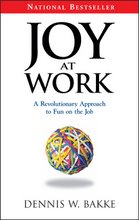Below is my Labor Day Op-Ed piece.
On Labor Day, I’m always curious about where people think the “best” places are to work. Magazines typically rank the best by some combination of good pay, benefits and bosses, exercise rooms and flexible hours. But I think the telling items are vacations and paid days off. The rankings indicate that the “best” places to work are the ones where people come to work the least.
That’s not surprising, in view of The Conference Board’s report last year that half of all Americans say they are dissatisfied with their jobs, up from 40 percent in 1995. The study is one of thousands like it, and yet none seems to address the root problem: We haven’t changed our view of work since the Industrial Revolution began, 300 years ago.
A stratified structure of capitalists, managers and workers persists today, and it’s flawed. Managers still tell the worker what to do, when to do it, and how to do it. Trust, decision-making and education are reserved for managers; distrust, service to the machinery and task-training are reserved for workers.
Worker dissatisfaction with this arrangement has led to general strikes, the formation of labor unions, and that famous Tuesday, September 5, 1882, when the Central Labor Union took an unpaid day off work and marched around Union Square in New York, to declare the first Labor Day. Over the next 12 years, it spread state by state to become a national holiday in 1894.
Yet today, U.S. workers labor nearly 2,000 hours per capita each year — more than any other industrialized nation — and half are dissatisfied. How can we break through this Industrial Revolution structure to create joy and fun where Americans spend most of their waking hours?
When I co-founded AES in 1981 — it later would become one of the world’s largest energy suppliers, with more than 30,000 people in 31 countries — it was the beginning of my audacious effort to create the most fun workplace ever, which I continue to pursue as CEO of Imagine Schools, a national charter-school operator.
We realized that finding joy at work is not about how many hours one puts in, but whether or not one has the freedom to make decisions. We were born to work, to use our skills and talents for things that are meaningful and useful to ourselves and others. When employees misunderstand the redeeming purpose of their work, and controlling bosses make all the important decisions, the vitality is sapped out of the whole structure.
People find little meaning in their work if its purpose is solely to make money. Working to make money for someone else is even less meaningful. So at AES, we changed our titles, worldwide, from “workers” and “managers” to “business people.” Using models from other companies, and creating our own, we flattened our organizational chart to reduce supervisory layers (no more than five between the CEO and an entry-level person), and we spun off our headquarters’ departments — HR, purchasing, engineering — to create field teams at our plants and offices across the globe. Each “remote” plant was in charge of all of its decision-making. All information was shared companywide, so, in effect, AES “business people” became “insiders,” restricted by the same stock-trading structures as CEOs and directors.
We created a culture in our company that saw every decision made by a boss as a lost opportunity to create joy at work for others. As CEO, I limited myself to one significant decision a year and asked other leaders in the organization to do the same.
Making even a few important decisions was all it took for employees to have fun at work. For many, it was the first time in their working lives that they had been treated with trust and respect. What separates humans from other species is our ability to reason, make decisions, and hold ourselves accountable. When we experience that opportunity at work or at play, it results in pure joy.
Work doesn’t have to be the drudgery “we have to get up and go do” each day. It can be as much fun as play. All it requires is a meaningful purpose to the work we undertake, and leaders who can restrain their own use of power to let workers make important decisions.
If this could happen, we might hear workers saying “Thank God it’s Monday” on every Monday of the year — not just on Labor Day.
Dennis Bakke (http://www.dennisbakke.com/) is the author of “Joy at Work” and the CEO of Imagine Schools.
Thursday
Subscribe to:
Post Comments (Atom)


No comments:
Post a Comment